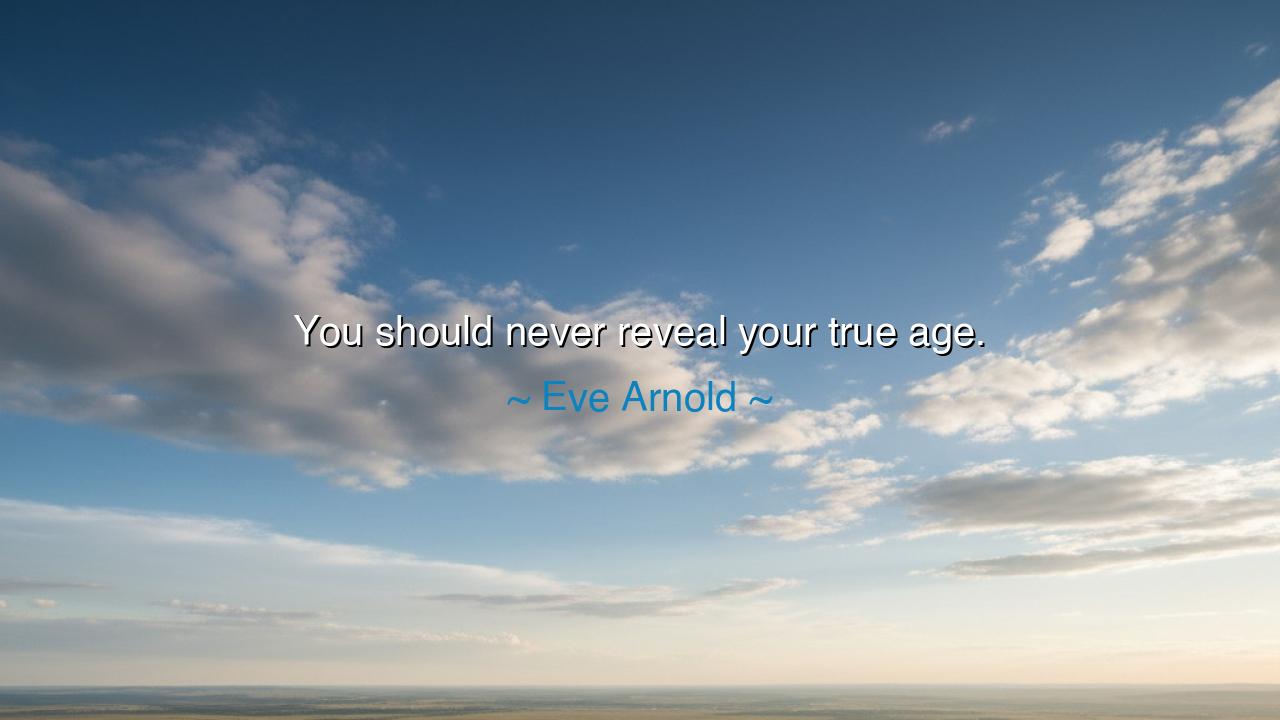
You should never reveal your true age.






"You should never reveal your true age." These words from Eve Arnold, the renowned photographer who captured the essence of many great figures, echo a profound wisdom that resonates beyond the vanity of youth and the passage of time. Arnold’s message, though seemingly simple, offers an important lesson about the nature of identity, the fragility of self-perception, and the power of mystery in the human experience. To reveal one’s true age is to strip away a layer of one’s mystique, to surrender a piece of one’s narrative to the cold hands of chronology. But, to withhold this revelation is to embrace the timelessness that exists in the heart of every individual, to resist the societal pressures that demand we be defined by the years we have lived.
In every culture, there is an awareness of the power that age holds. The elderly are often seen as bearers of wisdom, their faces etched with the stories of the ages, their hearts filled with the richness of experience. Yet, age also brings with it the perception of decline, of physicality giving way to frailty. To reveal one’s true age can invite judgment—whether that judgment is of the aging body or the assumption that the mind, too, has become weary with time. In a society that often values youth over experience, revelation of one’s true age can be a dangerous gamble. It can rob us of the opportunity to be seen as we truly are, not as the world expects us to be based on the number of years we have lived.
Consider the life of Cicero, the Roman statesman and philosopher. In his later years, despite his vast wisdom and intellectual achievements, Cicero's enemies would often use his age as a weapon against him. They saw in his years a weakness, a decline. But Cicero, knowing the power of his mind and spirit, did not define himself by the years that had passed. Instead, he clung to the enduring qualities of his character—his eloquence, his determination, and his deep knowledge. He understood that the mind could remain young, vibrant, and strong, regardless of the physical changes brought by the march of time. His true age, in many ways, was irrelevant to the essence of who he was.
The lesson of Eve Arnold’s words is not merely a call to preserve youthfulness through deception or avoidance but rather a call to maintain mystery—to remain a living testament to the fact that a person is far more than the number of years they have accumulated. Think of the great leaders, the artists, and the thinkers of history who, despite growing older, continued to inspire generations not through their years but through their actions and beliefs. Leonardo da Vinci, for example, remained active well into his later years, continually seeking new knowledge and new challenges. It was his vision—not his age—that defined him and continues to inspire today. Da Vinci's genius did not diminish with age, and he remained a figure of youthful spirit well into his final days.
Eve Arnold's quote invites us to consider the nature of self-revelation. When we share our true age with the world, we invite others to reduce us to mere numbers, to confine us to the physicality of the body. But to withhold such knowledge is to resist this reduction, to demand that we be seen for our essence, for the energy we exude, and the impact we have on the world. There is strength in mystery—a timeless allure that keeps us both relevant and mysterious, forever able to shape the narrative of who we are.
In practical terms, this lesson calls on us to embrace the agelessness of our character. Let us focus not on the fading of our bodies but on the growth of our minds, the sharpening of our hearts, and the deepening of our spirits. In a world obsessed with outward appearances and the fleeting markers of youth, the greatest triumph is to remain unfazed by the passage of time, continuing to live with vigor, passion, and purpose. We need not announce our age to the world; instead, we should let our actions, our kindness, and our creativity speak for us, demonstrating that we are not bound by time, but are eternal in our essence.
To live with this wisdom is to cultivate the art of timelessness. Just as the great philosophers, leaders, and artists of the past have done, we too must learn to navigate life with mystery as our ally. Our true age—the physical years we have lived—is but a fleeting shadow. What matters most is the legacy we leave, the energy we give, and the wisdom we pass on. So, let us follow Eve Arnold's advice: to keep our true age hidden and instead present the world with the ageless spirit that resides in each of us. For in that spirit, we are forever young, forever relevant, and forever capable of greatness.






AAdministratorAdministrator
Welcome, honored guests. Please leave a comment, we will respond soon